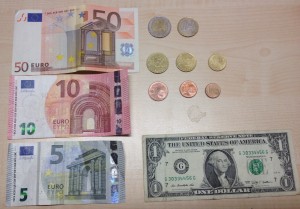Who am I kidding – the classes aren’t really particularly boring, but rather information about classes might not be the most interesting thing. Sorry about that.
First, I’ll focus on the classes offered through Valpo. These classes always take place in the same classroom, and all 16 of us are enrolled in all of them (not quite true, but I’ll get there later).
Here’s a video about our classroom and the building in which the classes occur:
Everybody takes one of the German classes, taught by Swantje. They meet in consecutive hours, and you enroll in whichever one better reflects your German abilities. 204 is the one you’ll need if you’re pursuing a German major or minor.
European Art & Architecture is taught by Dr. Walter Springer, an art historian from Tübingen. With Dr. Springer, we’ve discussed characteristics of gothic cathedrals (think Notre Dame in Paris), the structure of art (form, lines, colors, composition, etc.), and common themes in religious art. Prof. Springer often reserves the end of class for students to recreate famous paintings and sculptures, while he tries to identify the piece of art. He’s fairly good at this, and has even been able to correctly guess some more obscure pieces.
Economics is taught by Prof. Baldur Veit, who also runs the Reutlingen International Office and probably manages at least a dozen other things away from Hochschule. We’ve discussed how Germany and the EU work, what exactly went wrong with VW, and why Baden-Württemberg is a good place to live. We’ve been told that part of the final exam will be spelling “Baden-Württemberg,” a task which still seems to be difficult for many of us.
Utopian/Dystopian Literature and Social Theory is taught by Carter Hanson, who is also the director of the Valpo study center in Reutlingen for the next two years. This class can count for either English or social science credit. It features discussions of the questions raised by utopian thinking, regarding aspects of history, politics, culture, art, and morality.
Luther and Bach is also taught by Carter Hanson, and can count for history or theology credits. One of the early discussions was about how one can assess the validity of a biographical work. This class was also the basis of our second group trip to Leipzig, Erfurt, Eisenach, and Wittenberg.
These classes account for 16 credit hours, and fulfill general education requirements. Since one only needs 12 credit hours to maintain full-time student status at VU (and thus scholarships), not everybody is taking every class. Perhaps they already fulfilled their gen. eds., or perhaps they simply weren’t interested in taking a particular class.
Or perhaps they’re a VIEP (Valparaiso International Engineering Program) or EIB (Enhanced International Business) student, and have other requirements. For VIEP, we need to take one engineering class taught in German at the Hochschule. In the German academic calendar, the Wintersemester lasts from October to February, so you’re basically on two semesters at once. To be able to take these classes without a credit overload, one must drop a few of the Valpo courses. In my case, I left Utopian/Dystopian Literature and Luther & Bach. Though I had been looking forward to Luther & Bach, my schedule without either of them was a bit more conducive to travel.
This german course began for Nick and me three weeks ago. After initially attending a class that was well beyond our abilities, we switched into Kraft- and Arbeitsmaschinen (work and power machines), and found that to be far more appropriate for our level. Though lecture goes by somewhat quickly, between the two of us, we’ve been able to keep up just fine. However, the class so far has also been a review of thermodynamics and heat transfer, which has greatly improved our comprehension of the material. Though this class will certainly be a test of our skills, I’m confident that hard work will pay off for us both.
